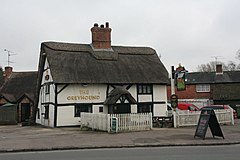Tidmarsh is a village in West Berkshire, England. Its development is mainly residential and agricultural, and is centred on the A340 road between Pangbourne and Theale. The rural area is bounded by the M4 motorway to the south. It is centred 1.5 miles (2.4 km) south of Pangbourne, 5.5 miles (8.9 km) west of Reading and 40 miles (64 km) west of London.
| Tidmarsh | |
|---|---|
| Village | |
 The 13th century Greyhound pub | |
Location within Berkshire | |
| Area | 7.02 km2 (2.71 sq mi) |
| Population | 501 (2011 census including Sulham)[1] |
| • Density | 71/km2 (180/sq mi) |
| OS grid reference | SU6374 |
| Civil parish |
|
| Unitary authority | |
| Ceremonial county | |
| Region | |
| Country | England |
| Sovereign state | United Kingdom |
| Post town | READING |
| Postcode district | RG8 |
| Dialling code | 0118 |
| Police | Thames Valley |
| Fire | Royal Berkshire |
| Ambulance | South Central |
| UK Parliament | |
Geography
editIts civil parish council is, unusually in this district, shared with another village and is called Tidmarsh with Sulham. Further east, Sulham Woods separate the villages from Tilehurst, a western suburb of Reading. Its elevation ranges between 42 m (138 ft) in the north-east, and 85 m (279 ft) AOD in the western projection. The vast majority of the parish (more than 90%) is at more than 5 m (16 ft) above the River Pang. Much of the main street is between 1–10 m (3 ft 3 in – 32 ft 10 in) above the river level.
Woodland covers less than a tenth of its total area but about a quarter of the western or south-western higher ground. The Pang flows north through the village and then through the Moor Copse Nature Reserve on its way to join the River Thames at Pangbourne. In December 2006 the reserve was doubled in size, to about 57 hectares (140 acres).[2] The Tidmarsh and Sulham circular walk, about 4.0 km (2.5 miles) long, passes through the reserve and both villages.
History
editThe Tidmarsh section of the A340 is thought to follow the Roman road from the Roman town of Calleva Atrebatum in Silchester (about 7 mi or 11 km south), either to Dorchester-on-Thames (about 10 mi or 16 km north)[citation needed] or a river-crossing at Pangbourne.[citation needed] If so, however, the southern portion has been straightened in later years.[citation needed] The earliest mention of Tidmarsh was in 1196.[citation needed] In 1239 there was a land-ownership dispute concerning the manor. There are records of a water corn-mill and a fishery in Tidmarsh in 1305.[3] The 18th century successor to the mill is now Grade II listed and converted to domestic accommodation.[4] There are multiple World War II pillboxes surrounding Tidmarsh, which made up part of the GHQ Line.[5]
Notable buildings
editThe most conspicuous listed building in Tidmarsh is the 13th century half-timbered Greyhound Pub,[6][7] which suffered a serious fire in 2005.[8]
Another historic building is the Grade I listed, 12th century church, which is dedicated to St Laurence. The church is particularly notable for its Norman south doorway, "very rare 13th century polygonal apse"[citation needed] and 13th century lancet windows. The church was restored and modified in the 19th century.[9] The old rectory dates from 1856.
Other notable buildings include the Grade II listed Round House and Mill House.[10][11]
Notable people
editNotable residents include author Lytton Strachey (1880–1932) and the painter Dora Carrington (1893–1932), who lived in the Mill House between 1917 and 1924.[12] Carrington painted the Greyhound Pub sign in the village.[citation needed] Rex Partridge, renamed Ralph by the Bloomsbury set,[13] also settled at Tidmarsh and formed a very 'Bloomsbury' trio with Lytton and Dora.[13]
Demography
edit| Output area | Homes owned outright | Owned with a loan | Socially rented | Privately rented | Other | km2 roads | km2 water | km2 domestic gardens | Usual residents | km2 |
|---|---|---|---|---|---|---|---|---|---|---|
| Civil parish | 83 | 81 | 2 | 35 | 5 | 0.130 | 0.071 | 0.171 | 501 | 7.02 |
References
edit- ^ a b Key Statistics: Dwellings; Quick Statistics: Population Density; Physical Environment: Land Use Survey 2005
- ^ Natural World Spring 2007 p10: "Ratty's Paradise joins eight new reserves"
- ^ "Tidmarsh History". British-history.ac.uk. Archived from the original on 30 November 2020. Retrieved 30 November 2020.
- ^ Historic England (19 June 1984). "Mill House and Mill Flat (Grade II) (1215730)". National Heritage List for England.
- ^ "Tod marsh Pillboxes". pillbox-study-group.org.uk. Retrieved 30 November 2020.
- ^ "Greyhound pub". historic england.org.uk. Retrieved 30 November 2020.
- ^ Historic England (19 June 1984). "The Greyhound public house (Grade I) (1215634)". National Heritage List for England.
- ^ "Blaze destroys 13th Century pub". bbc.co.uk. Archived from the original on 30 November 2020.
- ^ Historic England. "Details from listed building database (1287940)". National Heritage List for England. Retrieved 16 December 2014.
- ^ Historic England (19 June 1984). "The Round House (Grade II) (1215636)". National Heritage List for England.
- ^ Historic England (19 June 1984). "The Mill House and the Mill Flat (Grade II) (1215730)". National Heritage List for England.
- ^ "Tidmarsh Mill". Heritage Gateway. Retrieved 16 March 2023.
- ^ a b "The Mill at Tidmarsh: bohemian days leave a rich legacy". www.telegraph.co.uk.
External links
edit
